- Home
- Victoria Aveyard
Red Queen Page 2
Red Queen Read online
Page 2
Cantos pounds through the sand, sword held high, eyes on fire. And then he freezes midstep, his armor clanking with the sudden stop. From the middle of the arena, the bleeding warrior points at Cantos, with a stare to break bone.
Samson flicks his fingers and Cantos walks, perfectly in time with Samson’s movements. His mouth falls open, like he’s gone slow or stupid. Like his mind is gone.
I can’t believe my eyes.
A deathly quiet falls over the arena as we watch, not understanding the scene below us. Even Kilorn has nothing to say.
“A whisper,” I breathe aloud.
Never before have I seen one in the arena—I doubt anyone has. Whispers are rare, dangerous, and powerful, even among the Silvers, even in the capital. The rumors about them vary, but it boils down to something simple and chilling: they can enter your head, read your thoughts, and control your mind. And this is exactly what Samson is doing, having whispered his way past Cantos’s armor and muscle, into his very brain, where there are no defenses.
Cantos raises his sword, hands trembling. He’s trying to fight Samson’s power. But strong as he is, there’s no fighting the enemy in his mind.
Another twist of Samson’s hand and silverblood splashes across the sand as Cantos plunges his sword straight through his armor, into the flesh of his own stomach. Even up in the seats, I can hear the sickening squelch of metal cutting through meat.
As the blood gushes from Cantos, gasps echo across the arena. We’ve never seen so much blood here before.
Blue lights flash to life, bathing the arena floor in a ghostly glow, signaling the end of the match. Silver healers run across the sand, rushing to the fallen Cantos. Silvers aren’t supposed to die here. Silvers are supposed to fight bravely, to flaunt their skills, to put on a good show—but not die. After all, they aren’t Reds.
Officers move faster than I’ve ever seen before. A few are swifts, rushing to and fro in a blur as they herd us out. They don’t want us around if Cantos dies on the sand. Meanwhile, Samson strides from the arena like a titan. His gaze falls on Cantos’s body and I expect him to look apologetic. Instead, his face is blank, emotionless, and so cold. The match was nothing to him. We are nothing to him.
In school, we learned about the world before ours, about the angels and gods that lived in the sky, ruling the earth with kind and loving hands. Some say those are just stories, but I don’t believe that.
The gods rule us still. They have come down from the stars. And they are no longer kind.
UNCORRECTED E-PROOF—NOT FOR SALE
HarperCollins Publishers
..................................................................
TWO
Our house is small, even by Stilts standards, but at least we have a view. Before his injury, during one of his army leaves, Dad built the house high so we could see across the river. Even through the haze of summer you can see the cleared pockets of land that were once forest, now logged into oblivion. They look like a disease, but to the north and west, the untouched hills are a calm reminder. There is so much more out there. Beyond us, beyond the Silvers, beyond everything I know.
I climb the ladder up to the house, over worn wood shaped to the hands that ascend and descend every day. From this height I can see a few boats heading upriver, proudly flying their bright flags. Silvers. They’re the only ones rich enough to use private transportation. While they enjoy wheeled transports, pleasure boats, even high-flying airjets, we get nothing more than our own two feet, or a push cycle if we’re lucky.
The boats must be heading to Summerton, the small city that springs to life around the king’s summer residence. Gisa was there today, aiding the seamstress she is apprenticed to. They often go to the market there when the king visits, to sell her wares to the Silver merchants and nobles who follow the royals like ducklings. The palace itself is known as the Hall of the Sun, and it’s supposed to be a marvel, but I’ve never seen it. I don’t know why the royals have a second house, especially since the capital palace is so fine and beautiful. But like all Silvers, they don’t act out of need. They are driven by want. And what they want, they get.
Before I open the door to the usual chaos, I pat the flag fluttering from the porch. Three red stars on yellowed fabric, one for each brother, and room for more. Room for me. Most houses have flags like this, some with black stripes instead of stars in quiet reminder of dead children.
Inside, Mom sweats over the stove, stirring a pot of stew while my father glares at it from his wheelchair. Gisa embroiders at the table, making something beautiful and exquisite and entirely beyond my comprehension.
“I’m home,” I say to no one in particular. Dad answers with a wave, Mom a nod, and Gisa doesn’t look up from her scrap of silk.
I drop my pouch of stolen goods next to her, letting the coins jingle as much as they can. “I think I’ve got enough to get a proper cake for Dad’s birthday. And more batteries, enough to last the month.”
Gisa eyes the pouch, frowning with distaste. She’s only fourteen, but sharp for her age. “One day people are going to come and take everything you have.”
“Jealousy doesn’t become you, Gisa,” I scold, patting her on the head. Her hands fly up to her perfect, glossy red hair, brushing it back into her meticulous bun.
I’ve always wanted her hair, though I’d never tell her that. Where hers is like fire, my hair is what we call river brown. Dark at the root, pale at the ends, as the color leeches from our hair with the stress of Stilts life. Most keep their hair short to hide their gray ends but I don’t. I like the reminder that even my hair knows life shouldn’t be this way.
“I’m not jealous,” she huffs, returning to her work. She stitches flowers made of fire, each one a beautiful flame of thread against oily black silk.
“That’s beautiful, Gee.” I let my hand trace one of the flowers, marveling at the silky feel of it. She glances up and smiles softly, showing even teeth. As much as we fight, she knows she’s my little star.
And everyone knows I’m the jealous one, Gisa. I can’t do anything but steal from people who can actually do things.
Once she finishes her apprenticeship, she’ll be able to open her own shop. Silvers will come from all around to pay her for handkerchiefs and flags and clothing. Gisa will achieve what few Reds do and live well. She’ll provide for our parents and give me and my brothers menial jobs to get us out of the war. Gisa is going to save us one day, with nothing more than needle and thread.
“Night and day, my girls,” Mom mutters, running a finger through graying hair. She doesn’t mean it as an insult, but a prickly truth. Gisa is skilled, pretty, and sweet. I’m a bit rougher, as Mom kindly puts it. The dark to Gisa’s light. I suppose the only common things between us are the shared earrings, the memory of our brothers.
Dad wheezes from his corner and hammers his chest with a fist. This is common, since he only has one real lung. Luckily the skill of a Red medic saved him, replacing the collapsed lung with a device that could breathe for him. It wasn’t a Silver invention, as they have no need for such things. They have the healers. But healers don’t waste their time saving the Reds, or even working on the front lines keeping soldiers alive. Most of them remain in the cities, prolonging the lives of ancient Silvers, mending livers destroyed by alcohol and the like. So we’re forced to indulge in an underground market of technology and inventions to help better ourselves. Some are foolish, most don’t work—but a bit of clicking metal saved my dad’s life. I can always hear it ticking away, a tiny pulse to keep Dad breathing.
“I don’t want cake,” he grumbles. I don’t miss his glance toward his growing belly.
“Well, tell me what you do want, Dad. A new watch or—”
“Mare, I do not consider something you stole off someone’s wrist to be new.”
Before another war can brew in the Barrow house, Mom pulls the stew off the stove. “Dinner is served.” She brings it to the table and the fumes wash over me.
“It smells great, Mom,” Gisa lies. Dad is not so tactful and grimaces at the meal.
Not wanting to be shown up, I force down some stew. It’s not as bad as usual, to my pleasant surprise. “You used that pepper I brought you?”
Instead of nodding and smiling and thanking me for noticing, she flushes and doesn’t answer. She knows I stole it, just like all my gifts.
Gisa rolls her eyes over her soup, sensing where this is going.
You’d think by now I’d be used to it, but their disapproval wears on me.
Sighing, Mom lowers her face into her hands. “Mare, you know I appreciate—I just wish—”
I finish for her. “That I was like Gisa?”
Mom shakes her head. Another lie. “No, of course not. That’s not what I meant.”
“Right.” I’m sure they can sense my bitterness on the other side of the village. I try my best to keep my voice from breaking. “It’s the only way I can help out before—before I go away.”
Mentioning the war is a quick way to silence my house. Even Dad’s wheezing stops. Mom turns her head, her cheeks flushing red with anger. Under the table, Gisa’s hand closes around mine.
“I know you’re doing everything you can, for the right reasons,” Mom whispers. It takes a lot for her to say this, but it comforts me all the same.
I keep my mouth shut and force a nod.
Then Gisa jumps in her seat, like she’s been shocked. “Oh, I almost forgot. I stopped at the post on the way back from Summerton. There was a letter from Shade.”
It’s like setting off a bomb. Mom and Dad scramble, reaching for the dirty envelope Gisa pulls out of her jacket. I let them pass it over, examining the paper. Neither can read so they glean whatever they can from the paper itself.
Dad sniffs the letter, trying to place the scent. “Pine. Not smoke. That’s good. He’s away from the Choke.”
We all breathe a sigh of relief at that. The Choke is the bombed-out strip of land connecting Norta to the Lakelands, where most of the war is fought. Soldiers spend the majority of their time there, ducking in trenches doomed to explode or making daring pushes that end in a massacre. The rest of the border is mainly lake, though in the far north it becomes tundra too cold and barren to fight over. Dad was injured at the Choke years ago, when a bomb dropped on his unit. Now the Choke is so destroyed by decades of battle, the smoke of explosions is a constant fog and nothing can grow there. It’s dead and gray, like the future of the war.
He finally passes the letter over for me to read and I open it with great anticipation, both eager and afraid to see what Shade has to say.
Dear family, I am alive. Obviously.
That gets a chuckle out of Dad and me, and even a smile from Gisa. Mom is not as amused, even though Shade starts every letter like this.
We’ve been called away from the front, as Dad the Bloodhound has probably guessed. It’s nice, getting back to the main camps. It’s Red as the dawn up here, you barely even see the Silver officers. And without the Choke smoke, you can actually see the sun rise stronger every day. But I won’t be in for long. Command plans to repurpose the unit for lake combat and we’ve been assigned to one of the new warships. I met a medic detached from her unit who said she knew Tramy and that he’s fine. Took a bit of shrapnel retreating from the Choke, but he recovered nicely. No infection, no permanent damage.
Mom sighs aloud, shaking her head. “No permanent damage,” she scoffs.
Still nothing about Bree but I’m not worried. He’s the best of us and he’s coming up on his five-year leave. He’ll be home soon, Mom, so stop your worrying. Nothing else to report, at least that I can write in a letter. Gisa, don’t be too much of a show-off even though you deserve to be. Mare, don’t be such a brat all the time and stop beating up that Warren boy. Dad, I’m proud of you. Always. Love all of you.
Your favorite son and brother, Shade.
Like always, Shade’s words pierce through us. I can almost hear his voice if I try hard enough. Then the lights above us suddenly start to whine.
“Did no one put in the ration papers I got yesterday?” I ask before the lights flicker off, plunging us into darkness. As my eyes adjust, I can just see Mom shaking her head.
Gisa groans. “Can we not do this again?” Her chair scrapes as she stands up. “I’m going to bed. Try not to yell.”
But we don’t yell. Seems to be the way of my world—too tired to fight. Mom and Dad retreat to their bedroom, leaving me alone at the table. Normally I’d slip out, but I can’t find the will to do much more than go to sleep.
I climb up yet another ladder to the loft, where Gisa is already snoring. She can sleep like no other, dropping off in a minute or so, while it can sometimes take me hours. I settle into my cot, content to simply lie there and hold Shade’s letter. Like Dad said, it smells strongly of pine.
The river sounds nice tonight, tripping over stones in the riverbank as it lulls me to sleep. Even the old fridge, a rusty battery-run machine that usually whines so hard it hurts my head, doesn’t trouble me tonight. But then a birdcall interrupts my descent into sleep. Kilorn.
No. Go away.
Another call, louder this time. Gisa stirs a little, rolling over into her pillow.
Grumbling to myself, hating Kilorn, I roll out of my cot and slide down the ladder. A normal girl would have tripped over the clutter in the main room, but I have great footing thanks to years of running from officers. I’m down the stilt ladder in a second, landing ankle deep in the mud. Kilorn is waiting, appearing out of the shadows beneath the house.
“I hope you like black eyes because I have no problem giving you one for this—”
The sight of his face stops me short.
He’s been crying. Kilorn does not cry. His knuckles are bleeding too and I bet there’s a wall hurting just as hard somewhere nearby. In spite of myself, in spite of the late hour, I can’t help but feel concerned, even scared for him.
“What is it? What’s wrong?” Without thinking, I take his hand in mine, feeling the blood beneath my fingers. “What happened?”
He takes a moment to respond, working himself up. Now I’m terrified.
“My master—he fell. He died. I’m not an apprentice anymore.”
I try to hold in a gasp, but it echoes anyway, taunting us. Even though he doesn’t have to, even though I know what he’s trying to say, he continues.
“I hadn’t even finished training and now—” He trips over his words. “I’m eighteen. The other fishermen have apprentices. I’m not working. I can’t get work.”
The next words are like a knife in my heart. Kilorn draws a ragged breath and somehow I wish I wouldn’t have to hear him.
“They’re going to send me to the war.”
UNCORRECTED E-PROOF—NOT FOR SALE
HarperCollins Publishers
..................................................................
THREE
It’s been going on for the better part of the last hundred years. I don’t think it should even be called a war anymore, but there isn’t a word for this higher form of destruction. In school they told us it started over land. The Lakelands are flat and fertile, bordered by immense lakes full of fish. Not like the rocky, forested hills of Norta, where the farmlands can barely feed us. Even the Silvers felt the strain, so the king declared war, plunging us into a conflict neither side could really win.
The Lakelander king, another Silver, responded in kind, with the full support of his own nobility. They wanted our rivers, to get access to a sea that wasn’t frozen half the year, and the water mills dotting our rivers. The mills are what make our country strong, providing enough electricity so that even the Reds can have some. I’ve heard rumors of cities farther south, near the capital, Archeon, where greatly skilled Reds build machines beyond my comprehension. For transport on land, water, and sky, or weapons to rain destruction wherever the Silvers might need. Our teacher proudly told us Norta was the light of the world, a n
ation made great by our technology and power. All the rest, like the Lakelands or Piedmont to the south, live in darkness. We were lucky to be born here. Lucky. The word makes me want to scream.
But despite our electricity, the Lakelander food, our weapons, their numbers, neither side has much advantage over the other. Both have Silver officers and Red soldiers, fighting with abilities and guns and the shield of a thousand Red bodies. A war that was supposed to end less than a century ago still drags on. I always found it funny that we fought over food and water. Even the high-and-mighty Silvers need to eat.
But it isn’t funny now, not when Kilorn is going to be the next person I say good-bye to. I wonder if he’ll give me an earring, so I can remember him when the polished legionnaire takes him away.
“One week, Mare. One week and I’m gone.” His voice cracks, though he coughs to try and cover it up. “I can’t do this. They—they won’t take me.”
But I can see the fight going out of his eyes.
“There must be something we can do,” I blurt out.
“There’s nothing anyone can do. No one has escaped conscription and lived.”
He doesn’t need to tell me that. Every year, someone tries to run. And every year, they’re dragged back to the town square and hanged.
“No. We’ll find a way.”
Even now, he finds the strength to smirk at me. “We?”
The heat in my cheeks surges faster than any flame. “I’m doomed for conscription same as you, but they’re not going to get me either. So we run.”
The army has always been my fate, my punishment, I know that. But not his. It’s already taken too much from him.
“There’s nowhere we can go,” he sputters, but at least he’s arguing. At least he’s not giving up. “We’d never survive the north in winter, the east is the sea, the west is more war, the south is radiated to all hell—and everywhere in between is crawling with Silvers and Security.”
The words pour out of me like a river. “So is the village. Crawling with Silvers and Security. And we manage to steal right under their noses and escape with our heads.” My mind races, trying my hardest to find something, anything, that might be of use. And then it hits me like a bolt of lightning. “The black market trade, the one we help keep running, smuggles everything from grain to lightbulbs. Who’s to say they can’t smuggle people?”

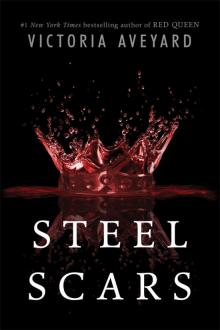 Red Queen Novella #2
Red Queen Novella #2 Red Queen Novella #1
Red Queen Novella #1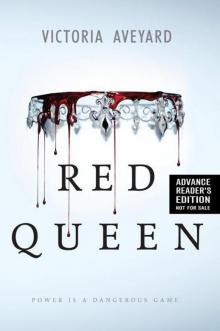 Red Queen
Red Queen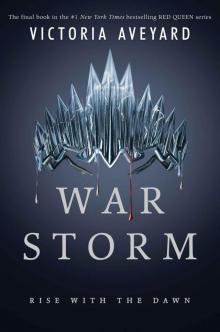 War Storm
War Storm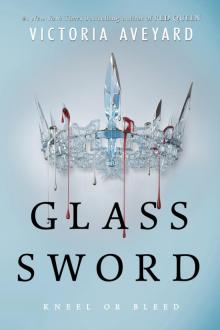 Glass Sword
Glass Sword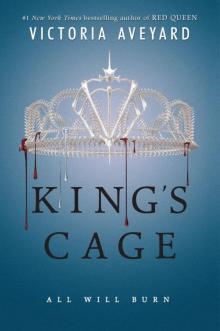 King's Cage
King's Cage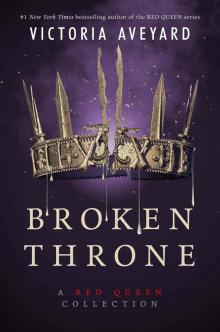 Broken Throne
Broken Throne